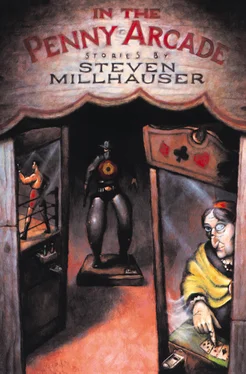“The tide’s coming in,” said Mrs. Halstrom, shaking out her hair. “You’ll feel much better, after a dip.”
“Silvercup,” said Dr. Halstrom decisively.
Catherine discovered that it was really two parties. The indoor party took place in the warm, lamplit playroom, with its out-of-tune piano that did not quite conceal a folded-up ping-pong table, and the outdoor party took place on the snowy slope of the Anderson back yard. From the top of the slope you could look down across the floodlit driveway to the dark, open garage at the side of the house. Under the floodlight the snow-lumped bushes, glazed and glistening, looked like crusted pastries with rich, soft centers. Now and then the inner door leading to the playroom would open, and there would come a burst of voices, laughter, and rock-and-roll, followed by sudden silence. A few moments later a shadowy, winter-coated figure would step from the garage into the glare of the floodlight, revealing itself to be Linda Shulick or Karen Soltis or Bill Newmeyer or Roger Murray or anyone else who might want to leave the hot, crowded room and come into the fresh winter night. The figure would cross the driveway, trudge up the hill, and join the group beside the willow for a smoke in the cold air or a ride down the path in the snow. The good thing about two parties was that you could pass back and forth between them. You never felt trapped.
The sledding path itself was simply a wonder. The path began at the top of the slope, beside the willow, and after a sweeping curve it headed sharply down. Then came a second, lesser curve, and a little more than halfway down, the path forked abruptly. You could steer to the right and continue down to the high snow and half-buried hedge near the bottom of the driveway, or you could steer to the left and pass the wild cherry and end up in the high snow near the mountain laurel in the flat part of the yard. From the bottom of the path you could look up at the yellow windows of the playroom. To everyone who arrived, Len Anderson explained that he and his father had shoveled the path all that day; and after dinner, when the temperature had fallen to twenty-six, Len had carried out pot after pot of water, coating the path carefully with a layer of ice. That was to ensure maximum speed. Mr. Anderson was a mechanical engineer, and Len always said things like “maximum efficiency” and “ensure maximum speed.” But Catherine thought it was a lovely path anyway. The snow on both sides was a foot and a half deep.
A new white Studebaker turned into the driveway, and at the same time, from the bottom of the hill, came shouts and laughter: Bob Carwin and Bonnie Baker tumbling into the snow. “Hey, Bobby boy, none of that, now!” “He did that on purpose.” The night sky was a rich, dark blue. It seemed to Catherine, taking deep breaths, that she smelled the richness and freshness of the dark-blue winter night. She wondered whether it was possible to know a winter night by its smell, the way you could know a summer night or an autumn night by its smell. The Studebaker stopped at the top of the drive, and under the floodlight Sonia Holmes got out. Perhaps it was possible to smell snow. It would be a white, cool, fresh smell, like the smell of a cool white sheet. Or was snow simply an absence of smell: of the sharp green aroma of grass, the faintly acrid smell of moist earth? Bev Carlotti came over to Catherine. “I can’t believe it. Do you see what she’s wearing?” Sonia Holmes went into the garage.
Roger said, “Have you seen my sled? I left it against the tree. It’s gone.”
“Oh, look!” said Catherine. She was stunned. “Was that a rabbit?” A little animal had gone hobbling across the dark upper yard.
“A cat, I think,” someone said.
“A rat,” someone else said.
“A skirt to go sledding in. Nylons; the whole bit. She kills me. She’s probably wearing heels. I suppose she thinks it’s the spring dance.”
“Well,” said Brad, “at least she didn’t come in a bathing suit.”
“Don’t bet on it. She gives me a swift pain I hate to say where. She ought to wear a sign on her chest: Look on my works, ye Mighty, and despair.”
“It didn’t look like a cat,” said Catherine. “Unless cats hop. Cats don’t, do they?”
“They might,” said Roger, “in the snow. They might have to. Someone stole my sled. This isn’t a bad party. At least they let you smoke.”
“You sound like my father,” said Catherine. “This party is not unwonderful.”
“This party,” said Roger, “is very unbad.”
Sonia Holmes had come to the sledding party wearing nylons. Catherine imagined her long, sleek legs glittering in the moonlight as she sledded down the path, under the dark, rich-blue sky. It seemed festive. Why not?
“Maybe she isn’t planning to go sledding,” said Brad. “I hope she is, though. It might be worth watching — especially if she falls off.”
“I bet she came to the wrong party,” said Bev. “Whoops, ’scuse me, folks. I just stopped by to use your convenience. Can someone point the way to the powder room? Cath, what on earth are you doing?”
“I was looking at the moon. My eyes were closed because I was trying to see if I could tell whether the moon was out even if my eyes were closed. Parties make me feel a little insane. Listen, here’s what we’ll do. We’ll call Mr. Holmes. Mr. Holmes, a dreadful accident has occurred. Mr. Holmes, I regret to inform you that your daughter has lost her pants. She’s hiding in the cellar, Mr. Holmes. Mr. Holmes, I know we can trust you to be discreet.”
“Well, could you?” said Roger.
“What are you talking about?”
“The moon. You said you were trying to tell if the moon — welcome, stranger.”
“Ride down with me, Cath?” It was Peter Schiller, holding a sled.
“Sure. But let me steer, all right? Listen, do you know what Bev said? She said Sonia ought to wear a sign around her chest: Look on my works, ye Mighty, and despair.”
“Ozymandias,” said Peter.
Catherine looked away in sharp irritation.
“She came in a skirt and stockings,” he said.
“We know.”
“But you don’t know what she said. When she came into the room Helen said to her, ‘Are you going sledding like that ?’ She gave Helen one of her Sonia looks and said, ‘I didn’t think you had to go.’ That was how she said it: ‘I didn’t think you had to go.’” Peter laughed. “Well, come on. Have you done it with two before?”
“Not exactly.”
He put down the sled. “Well, it’s a little tricky.” He bent over the sled, pushed it lightly to the start of the path, and lay down. He looked over his shoulder. “Just think of me as a sled. Try not to get off center. I can’t steer much with my hands on the inside, but I can help a little. It’s better to get a running start, but we’ll ask Brad to push us off this time. O.K.?”
“I’ll just think of you as a sled, Peter.” As she said it, laughing, Catherine was startled at the cruel and mocking sound of her words, but no one seemed to notice. Peter lay on the sled in his heavy coat and tucked-in scarf. She lay down on top of him, shifted about, and grasped the outside of the steering bar. She felt awfully high up. Her boots kept sliding off his legs. “Put your feet on the sled, Cath, it’s safer. O.K., Brad. Give us a push. Easy.” Brad bent over them and eased them forward along the flat start of the path. He gave a light push and released them.
Catherine steered clumsily around the curve and felt herself slipping to one side, but she managed to stay on as they swung onto the downward path. The runners rushed over the glazed snow, and she felt herself still slipping to one side as they took the second curve and came to the fork. She turned sharply to the left, rocking the sled and feeling a boot drag against the snowbank. She jerked to the right, and suddenly they were rushing at the right bank; Catherine braced herself, but somehow they were back on the path. Half on and half off, they rushed past the wild cherry and came to an abrupt stop in the high snow. Catherine fell off. “Damn.” She burst into laughter, lying on her back in the snow. The sky was dark, radiant blue. The moon was so bright that it seemed lit from within. It reminded her of the eye of a great cat. The night was a dark blue cat with a mad moon eye. Snow burned on her cheeks and a soft powder of snow stirred in the air about her. She could feel a coil of hair on her snow-wet cheek. She stretched out her arms and began moving them back and forth in the snow, as if she were giving semaphore signals. Peter stared down at her. “You’d better get up, Cath. What are you doing?” “Snow-angels. Didn’t you ever do that as a kid?” He stared down at her and she burst out laughing. “Oh, Peter, you look so bewildered!” She stood up, dusting off snow.
Читать дальше












